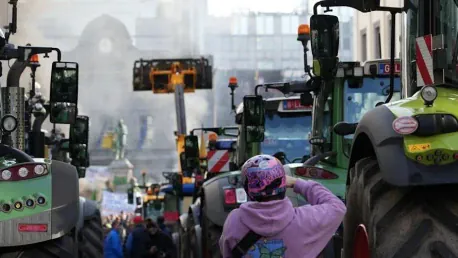The unrest brewing among French farmers over the EU-Mercosur trade deal has put frontline workers in agriculture at odds with international trade policies. Farmers are concerned about the potential influx of agricultural products from South America, such as beef and soybeans, which could undermine their livelihoods. The core of their anger lies in the disparity between the stringent EU agricultural regulations and the perceived lax standards in the Mercosur nations, which include Brazil, Argentina, Paraguay, Uruguay, and Bolivia. French farmers argue that this deal would usher in products cultivated with less stringent environmental and labor regulations.
Recently, farmers in Aurillac—even as far south as Southern France—have taken to forcefully expressing their grievances, marking the start of what looks to be widespread protests leading up to the G20 summit in Brazil. French Agriculture Minister Annie Genevard has indicated that it is “highly unlikely” that the agreement will be finalized at the summit. Nevertheless, the grassroots movements by over 600 French legislators against this deal have become significant enough for them to air their grievances directly to EU Commission President Ursula von der Leyen. It seems that the roadblocks have only just begun.
The Context and Early Protests
The EU-Mercosur trade agreement, initially reached in 2019, has long been a bone of contention among European farmers, especially those in France. They argue that the deal fosters unfair competition by allowing South American products to flood the market, produced under less rigorous environmental and labor standards. The core issue is the concern that these products would come at a lower cost due to less environmentally friendly, pesticide-heavy production methods, effectively undercutting local farmers in Europe operating under stricter regulations. This has been an ongoing contention point for years, exacerbating the tension between international trade ambitions and local agricultural sustainability.
Last week in Niort, French farmers went so far as to blockade a state building, a visible manifestation of their discontent. Around the same time, the Copa-Cogeca group—representing European farmers’ interests—sent a forceful appeal to Ursula von der Leyen to outright reject the Mercosur deal. The expression of dissatisfaction has spread beyond French borders. Belgian farmers have also thrown their weight behind their French counterparts, planning demonstrations near the EU headquarters in Brussels. This growing coalition of concerned farmers underscores the significant potential impact on local agriculture if the trade agreement is implemented.
Broader Implications and Farmer Unity
Prominent farming unions in France like FNSEA, Coordination Rurale, and Confédération Paysanne have all voiced their intentions to pursue further protests, with plans unfolding nationally as the G20 summit approaches. FNSEA is gearing up for massive demonstrations after the winter sowing season, while Coordination Rurale and Confédération Paysanne are starting their actions in mid-November. This synchronized wave of protests reflects the broad and unified stance of the agricultural community against what they see as a debilitating agreement for their livelihoods.
The French government also shares these concerns. Agriculture Minister Annie Genevard has reiterated the nation’s opposition to the EU-Mercosur deal, citing potential environmental hazards and the influx of products manufactured with substances banned in the EU. French President Emmanuel Macron has echoed similar sentiments, labeling the deal “terrible” and “outdated” unless South American producers meet European standards. Despite the government’s pronounced opposition, skepticism among farmers like Coordination Rurale’s President Véronique Le Floc’h persists, as they find the government’s resolve questionable under international pressure.
The Path Forward
French farmers are increasingly upset over the EU-Mercosur trade deal, which puts them at odds with international trade policies. They worry that an influx of agricultural goods like beef and soybeans from South America could threaten their livelihoods. The core issue is the difference between strict EU agricultural rules and the more lenient standards in Mercosur countries such as Brazil, Argentina, Paraguay, Uruguay, and Bolivia. French farmers argue that this agreement would bring in products produced with lower environmental and labor standards.
Recently, protests have erupted, even reaching areas as far south as Aurillac in Southern France, signaling the beginning of what appears to be widespread unrest leading up to the G20 summit in Brazil. French Agriculture Minister Annie Genevard has stated that it is “highly unlikely” the agreement will be finalized at the summit. However, the grassroots movements, supported by over 600 French legislators, have grown substantial enough to bring their complaints directly to EU Commission President Ursula von der Leyen. These hurdles indicate that the real challenges are just starting.









